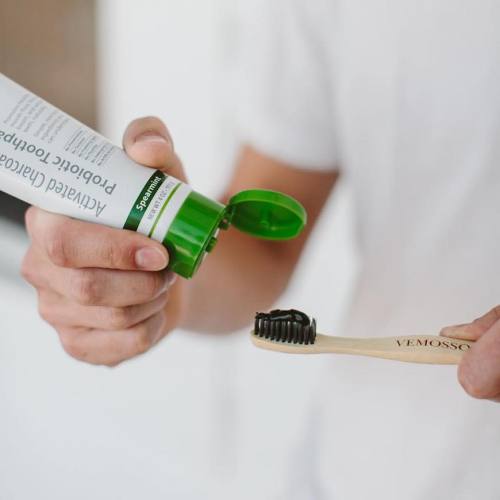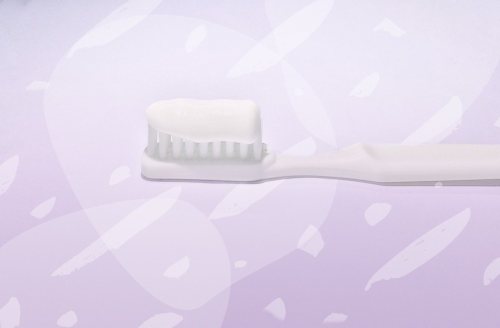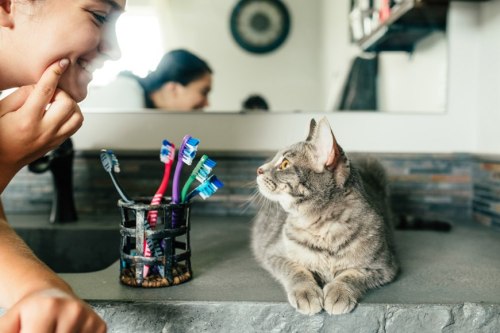Our editors independently select these products. Making a purchase through our links may earn Well+Good a commission
Drake may be brushing with activated charcoal toothpaste and health food stores may be selling the oral essential enhanced with superfoods and vitamins, but those aren’t the only on-trend ingredients making a foray into dental care. The latest add-in to look out for? Probiotics.
Hyperbiotics, known for its gut-healthy supplements, touts its own probiotic toothpaste and chewable probiotic dental tablets—made with a blend of four bacteria strains, plus zinc. Revitin takes a slightly different approach with the world’s first prebiotic toothpaste, which is said to help balance the oral microbiome naturally and protect against tooth decay.
Intriguing as these products may sound, they do raise a few questions. You probably already know that probiotics are good for digestion (and mood), but how, exactly, do they play into oral health? And isn’t eating fermented foods, sipping kombucha, and popping a daily capsule enough?
Here, holistic dentist Lewis Ehrlich, DMD, weighs in on this new category—and gives his opinion on whether there’s any merit to it.
Should you be brushing with a probiotic toothpaste? Keep reading to find out.

All about the microbiome in your mouth
Dr. Ehrlich, who isn’t tied to any oral health brands, says he definitely sees the benefit of this new trend. “Traditional toothpaste has a lot of chemicals to eradicate bad bacteria, but it also causes collateral damage, wiping out the good bacteria, too,” he explains, comparing fluoride-based toothpaste to antibiotics in that way.
“Traditional toothpaste has a lot of chemicals to eradicate bad bacteria, but it also causes collateral damage, wiping out the good bacteria, too.” – Lewis Ehrlich, DMD
While most people tend to think of pre- and probiotics being good for the gut, Dr. Ehrlich says they’re good for your mouth, too. “Bad bacteria can hide down in the deep pockets of gum tissue and can actually live without oxygen,” he says. Yes, brushing, flossing, and getting regular cleanings help wipe out the bad guys, but probiotic toothpaste can help tip the balance in the good bacteria’s favor.
Hyperbiotics co-founder Jamie Morea says that exact realization is why she decided to expand her probiotic line to oral care. “It works by repopulating the oral microbiome with beneficial bacteria promoting dental, immune, and upper respiratory health, while crowding out the bad bacteria that cause bad breath, cavities, and periodontal disease,” she says. “So many products on the market today contain harsh preservatives and antimicrobial ingredients that deplete the beneficial bacteria that we need for dental and upper respiratory health. [This is a way to] restore those populations of healthy microbes.”

Do probiotic toothpastes help the gut, too?
Okay, so there’s a definite connection between good bacteria and oral health. But are these new probiotic goodies for your mouth doing anything for your gut? Dr. Ehrlich says yes. “Digestion starts in the mouth,” he points out. “We swallow between 800 and 2,000 times a day, so you’re going to be transporting some bacteria down into the gut as well.”
While pre- and probiotic dental products can help, he says that eating probiotic-rich foods does, too. “The key is to eat a natural, diverse diet that isn’t highly processed or full of inflammatory foods,” he says. “That’s when the bacteria in the mouth will actually be more favorable.”
Like most things that are good for your body, this is another example of how nothing is a vacuum: A nutrient that benefits the body in one way is likely benefiting it in other ways, too. So no matter how you’re getting your pre- and probiotic fill, you’re making your whole body happy—including your mouth.
Speaking of oral health, here are six common mistakes even healthy people make. And here are the latest and greatest toothbrushes, mouthwashes, and other products that’ll brighten your smile.
Sign Up for Our Daily Newsletter
Get all the latest in wellness, trends, food, fitness, beauty, and more delivered right to your inbox.
Got it, you've been added to our email list.











